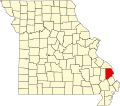2010 census
At the 2010 census there were 4,565 people, 1,794 households, and 1,245 families living in the city. The population density was 973.3 inhabitants per square mile (375.8/km2). There were 2,002 housing units at an average density of 426.9 per square mile (164.8/km2). The racial makeup of the city was 96.93% White, 0.68% Black or African American, 0.26% Native American, 0.24% Asian, 0.83% from other races, and 1.05% from two or more races. Hispanic or Latino of any race were 1.45%. [14]
Of the 1,794 households 36.2% had children under the age of 18 living with them, 50.2% were married couples living together, 14.4% had a female householder with no husband present, 4.8% had a male householder with no wife present, and 30.6% were non-families. 26.1% of households were one person and 11% were one person aged 65 or older. The average household size was 2.54 and the average family size was 3.02.
The median age was 36.3 years. 25.6% of residents were under the age of 18; 9.1% were between the ages of 18 and 24; 27.3% were from 25 to 44; 24.8% were from 45 to 64; and 13.2% were 65 or older. The gender makeup of the city was 48.3% male and 51.7% female.
2000 census
At the 2000 census there were 4,591 people, 1,801 households, and 1,287 families living in the city. The population density was 999.1 inhabitants per square mile (385.8/km2). There were 1,953 housing units at an average density of 425.0 per square mile (164.1/km2). The racial makeup of the city was 98.26% White, 0.39% African American, 0.37% Native American, 0.04% Asian, 0.13% from other races, and 0.81% from two or more races. Hispanic or Latino of any race were 0.63%. [4]
Of the 1,801 households 35.1% had children under the age of 18 living with them, 53.8% were married couples living together, 13.3% had a female householder with no husband present, and 28.5% were non-families. 24.8% of households were one person and 10.5% were one person aged 65 or older. The average household size was 2.54 and the average family size was 3.02.
The age distribution was 26.6% under the age of 18, 9.0% from 18 to 24, 29.1% from 25 to 44, 22.9% from 45 to 64, and 12.4% 65 or older. The median age was 35 years. For every 100 females, there were 92.7 males. For every 100 females age 18 and over, there were 87.6 males.
The median household income was $31,958 and the median family income was $36,763. Males had a median income of $30,088 versus $17,061 for females. The per capita income for the city was $15,099. About 8.6% of families and 12.8% of the population were below the poverty line, including 22.6% of those under age 18 and 13.5% of those age 65 or over.


